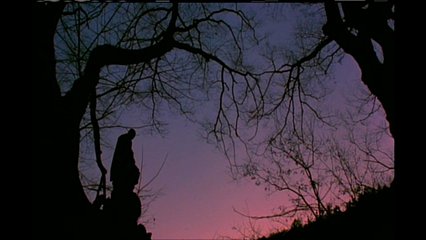I would say the very fact its not "egregious" is its strength
Forgive me. I'm not sure what you mean here. I was referring to the decision to reveal her guilt in a flashback as "not egregious". Not the scene itself, or her actions.
Instead it draws you into what you think is more standard family interaction only for it to be revealed that the prickly nature of this interaction has left her saddled with guilt. That mirrors the wider impact of the scene that forces us to look at her actions previously in the film in a different manner as well.
So basically, "The smart ones will figure this out."

That's OK as well. I tend not to be sold on writing I have to do the work for.
Your assuming that the audience needs to know total character motivation as each scene unfolds
Nope; it's an exercise. I'm trying to tie the conversation down to specifics because it helps to discuss writing beyond stating the way we feel instinctively about it ("I like it because it doesn't feel cliche or straightforward") by nailing it down to how functional it is (what did the scene intend and how far was it successful).
I wasn't arguing the motivations of every scene, but asking what Heyes' most visceral scenes conveyed to the audience on the whole about her character. To put it simply, someone who feels guilty about her little girl being raped doesn't kick a girl of a similar age in the vagina.
You found the flashback contextualised these actions (they were borne of guilt). I think the audience laughed at each, and moved on to the next (angry lady is funny).
I felt her interaction with Harrelson's shieff evolved very nicely in this fashion as well showing that what might have looked like pure antagonism actually did have some degree of mutual respect.
Can you track this evolution in the script? This was the arc of the relationship as I read it:
BEAT I: She blames him enough to call him out in public with billboards, and to refuse to (albeit with some hesitation) give a shit about his cancer.
BEAT II: She beats up the dentist and is kind to him when he coughs blood onto her.
BEAT III: She respects him because he paid for the billboards for another month before croaking.
Did I miss a script beat between the two? Outside of his being sick, why respect him? For pity? Is that strong on the page to you?
Perhaps it is, but recall that Willoughby's major motivations - what turned her - are revealed via voiced-over epistles. None of his on-screen actions tell us anything about him until the letters spell out the "why". Was it subtle/nuanced to explain why he paid for billboards, why he thought Dixon should change, why he was taking his own life, in letters?
Well you can dislike subtle cinema if you want to I spose....
Not sure where you got that from. I just don't think the quality of being "subtle" or "nuanced" makes a film work better than, for example, a good action movie. I probably lean towards good genre fare, but on any given day can enjoy movies where character motivations are all over the place.
Here's why:
Subtlety doesn't matter. For one, whether a film is subtle depends too much on a person's viewing history to really mean anything. It's an exercise in vanity to judge a film in such light, because it pits ones viewing history against other viewers'. It isn't about the film, but
you.
What matters is whether the film (largely) achieves its ends despite perceived subtlety or a lack of it.
.... but that does not to me put you in a very good position to claim to judge ithe specific merits of an example of it.

That's fine. You wouldn't be the first. I like to think I'm not judging anything. I didn't care for the film but like to talk about it regardless. And in that sense, it adds value to my life.
I enjoyed Looper but a good deal of its success comes from the complexity of its world building, in terms of its drama I would not personally say its some gold standard other films should look to reach. Its character motivations do go beyond the standard ones its true but there tends to be a lack of complexity and realism to those motivations to me with to much dependence on telling us them in a straight forward fashion.
I think McDonagh's strength is that whilst his films do have to a greater or lesser degree somewhat elevated reality the characters do actually have a more nuanced motivation and morality to them. In mean the fact that nobody reaches the kind of moral perfection of Joseph Gordon Levitt's sacrifice at the end of Looper doesn't mean they don't either progress morally or have greater morality revealed, something I find a truer reflection of real life.
Yup. The subtlety thing. Got it. Good to know where you're coming from.
Leaving space for your actors to sell your drama is I'd say generally a sign of good film making, humans are afterall keyed to empathise with people as well as concepts, an actor showing sadness, anger, etc effectively is generally going to beat just telling us there emotional state.
Dramatisation isn't a character telling the viewer his/her emotional state. It's when the medium does this work.
This is great dramatisation:
Watched some of A Serious Man. Probably one of my favourite Coen films, perfect take on 'the absurd' and De Beauvoir's idea of the serious man.
Such a good film. I struggled with it the first time but it worked better for me once I'd seen the rest of their work.





